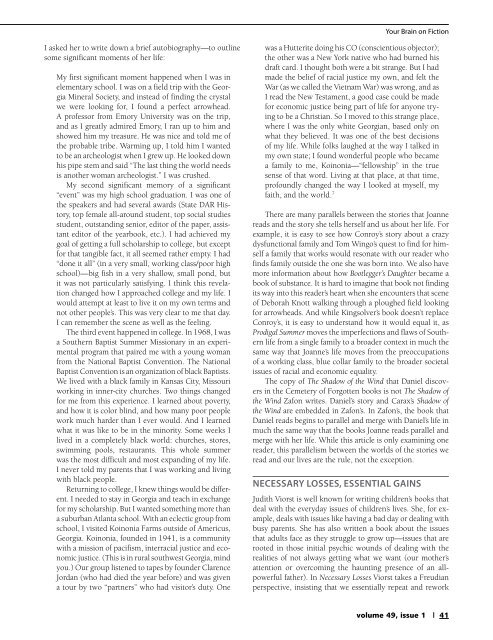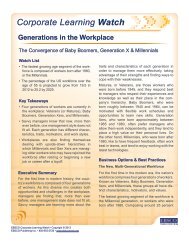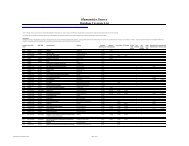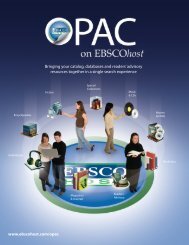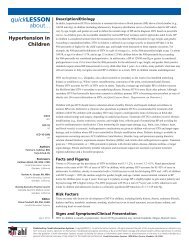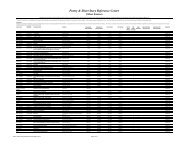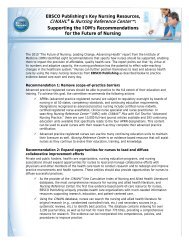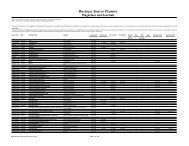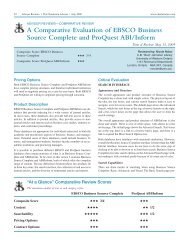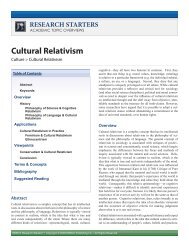your brain on Fiction - EBSCO Publishing
your brain on Fiction - EBSCO Publishing
your brain on Fiction - EBSCO Publishing
Create successful ePaper yourself
Turn your PDF publications into a flip-book with our unique Google optimized e-Paper software.
I asked her to write down a brief autobiography—to outline<br />
some significant moments of her life:<br />
My first significant moment happened when I was in<br />
elementary school. I was <strong>on</strong> a field trip with the Georgia<br />
Mineral Society, and instead of finding the crystal<br />
we were looking for, I found a perfect arrowhead.<br />
A professor from Emory University was <strong>on</strong> the trip,<br />
and as I greatly admired Emory, I ran up to him and<br />
showed him my treasure. He was nice and told me of<br />
the probable tribe. Warming up, I told him I wanted<br />
to be an archeologist when I grew up. He looked down<br />
his pipe stem and said “The last thing the world needs<br />
is another woman archeologist.” I was crushed.<br />
My sec<strong>on</strong>d significant memory of a significant<br />
“event” was my high school graduati<strong>on</strong>. I was <strong>on</strong>e of<br />
the speakers and had several awards (State DAR History,<br />
top female all-around student, top social studies<br />
student, outstanding senior, editor of the paper, assistant<br />
editor of the yearbook, etc.). I had achieved my<br />
goal of getting a full scholarship to college, but except<br />
for that tangible fact, it all seemed rather empty. I had<br />
“d<strong>on</strong>e it all” (in a very small, working class/poor high<br />
school)—big fish in a very shallow, small p<strong>on</strong>d, but<br />
it was not particularly satisfying. I think this revelati<strong>on</strong><br />
changed how I approached college and my life. I<br />
would attempt at least to live it <strong>on</strong> my own terms and<br />
not other people’s. This was very clear to me that day.<br />
I can remember the scene as well as the feeling.<br />
The third event happened in college. In 1968, I was<br />
a Southern Baptist Summer Missi<strong>on</strong>ary in an experimental<br />
program that paired me with a young woman<br />
from the Nati<strong>on</strong>al Baptist C<strong>on</strong>venti<strong>on</strong>. The Nati<strong>on</strong>al<br />
Baptist C<strong>on</strong>venti<strong>on</strong> is an organizati<strong>on</strong> of black Baptists.<br />
We lived with a black family in Kansas City, Missouri<br />
working in inner-city churches. Two things changed<br />
for me from this experience. I learned about poverty,<br />
and how it is color blind, and how many poor people<br />
work much harder than I ever would. And I learned<br />
what it was like to be in the minority. Some weeks I<br />
lived in a completely black world: churches, stores,<br />
swimming pools, restaurants. This whole summer<br />
was the most difficult and most expanding of my life.<br />
I never told my parents that I was working and living<br />
with black people.<br />
Returning to college, I knew things would be different.<br />
I needed to stay in Georgia and teach in exchange<br />
for my scholarship. But I wanted something more than<br />
a suburban Atlanta school. With an eclectic group from<br />
school, I visited Koin<strong>on</strong>ia Farms outside of Americus,<br />
Georgia. Koin<strong>on</strong>ia, founded in 1941, is a community<br />
with a missi<strong>on</strong> of pacifism, interracial justice and ec<strong>on</strong>omic<br />
justice. (This is in rural southwest Georgia, mind<br />
you.) Our group listened to tapes by founder Clarence<br />
Jordan (who had died the year before) and was given<br />
a tour by two “partners” who had visitor’s duty. One<br />
Your Brain <strong>on</strong> Ficti<strong>on</strong><br />
was a Hutterite doing his CO (c<strong>on</strong>scientious objector);<br />
the other was a New York native who had burned his<br />
draft card. I thought both were a bit strange. But I had<br />
made the belief of racial justice my own, and felt the<br />
War (as we called the Vietnam War) was wr<strong>on</strong>g, and as<br />
I read the New Testament, a good case could be made<br />
for ec<strong>on</strong>omic justice being part of life for any<strong>on</strong>e trying<br />
to be a Christian. So I moved to this strange place,<br />
where I was the <strong>on</strong>ly white Georgian, based <strong>on</strong>ly <strong>on</strong><br />
what they believed. It was <strong>on</strong>e of the best decisi<strong>on</strong>s<br />
of my life. While folks laughed at the way I talked in<br />
my own state; I found w<strong>on</strong>derful people who became<br />
a family to me, Koin<strong>on</strong>ia—“fellowship” in the true<br />
sense of that word. Living at that place, at that time,<br />
profoundly changed the way I looked at myself, my<br />
faith, and the world. 7<br />
There are many parallels between the stories that Joanne<br />
reads and the story she tells herself and us about her life. For<br />
example, it is easy to see how C<strong>on</strong>roy’s story about a crazy<br />
dysfuncti<strong>on</strong>al family and Tom Wingo’s quest to find for himself<br />
a family that works would res<strong>on</strong>ate with our reader who<br />
finds family outside the <strong>on</strong>e she was born into. We also have<br />
more informati<strong>on</strong> about how Bootlegger’s Daughter became a<br />
book of substance. It is hard to imagine that book not finding<br />
its way into this reader’s heart when she encounters that scene<br />
of Deborah Knott walking through a ploughed field looking<br />
for arrowheads. And while Kingsolver’s book doesn’t replace<br />
C<strong>on</strong>roy’s, it is easy to understand how it would equal it, as<br />
Prodigal Summer moves the imperfecti<strong>on</strong>s and flaws of Southern<br />
life from a single family to a broader c<strong>on</strong>text in much the<br />
same way that Joanne’s life moves from the preoccupati<strong>on</strong>s<br />
of a working class, blue collar family to the broader societal<br />
issues of racial and ec<strong>on</strong>omic equality.<br />
The copy of The Shadow of the Wind that Daniel discovers<br />
in the Cemetery of Forgotten books is not The Shadow of<br />
the Wind Zaf<strong>on</strong> writes. Daniel’s story and Carax’s Shadow of<br />
the Wind are embedded in Zaf<strong>on</strong>’s. In Zaf<strong>on</strong>’s, the book that<br />
Daniel reads begins to parallel and merge with Daniel’s life in<br />
much the same way that the books Joanne reads parallel and<br />
merge with her life. While this article is <strong>on</strong>ly examining <strong>on</strong>e<br />
reader, this parallelism between the worlds of the stories we<br />
read and our lives are the rule, not the excepti<strong>on</strong>.<br />
nECESSARy LOSSES, ESSEnTIAL GAInS<br />
Judith Viorst is well known for writing children’s books that<br />
deal with the everyday issues of children’s lives. She, for example,<br />
deals with issues like having a bad day or dealing with<br />
busy parents. She has also written a book about the issues<br />
that adults face as they struggle to grow up—issues that are<br />
rooted in those initial psychic wounds of dealing with the<br />
realities of not always getting what we want (our mother’s<br />
attenti<strong>on</strong> or overcoming the haunting presence of an allpowerful<br />
father). In Necessary Losses Viorst takes a Freudian<br />
perspective, insisting that we essentially repeat and rework<br />
volume 49, issue 1 | 41


